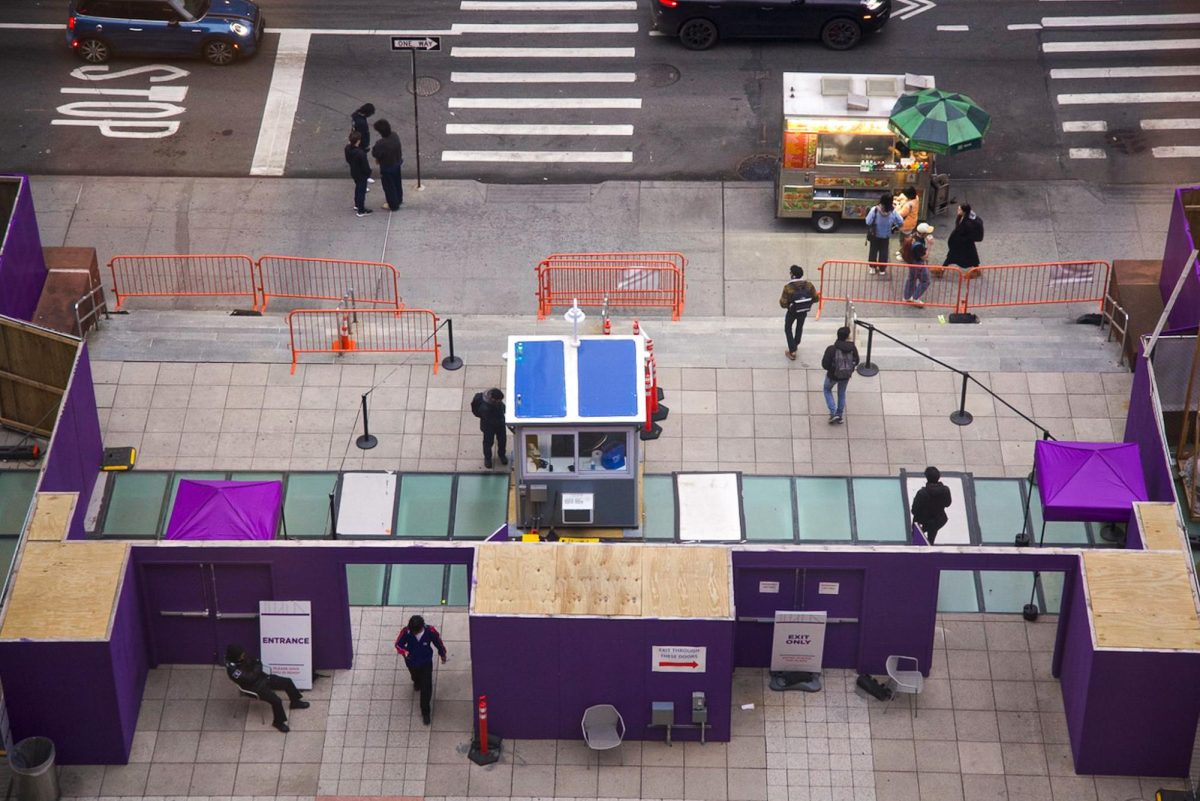On April 22, 2024, students set up a pro-Palestinian encampment on Gould Plaza in protest of NYU’s ties to Israel amid its ongoing war in Gaza. Protestors demanded the university to shut down its study away site in Tel Aviv and to divest from companies that have financial operations in Israel. Within 24 hours, a barricade, which still stands today, was installed after dozens of students and faculty were arrested in an NYU authorized police sweep.
Now, the university has begun to boast about these renovations. In a Sept. 25 Instagram reel, NYU put the construction process on display, reaffirming its desire to use these renovations to foster a “more welcoming and inclusive space for the entire NYU community.” However, while advertising of the project promises inclusivity and highlights its strong architectural developments, such as new skylights to brighten up the classrooms in its adjacent buildings, the reality of the administration’s intention is ironically dim.
While the plaza has been closed off for nearly 18 months, these barriers have only gotten more restrictive, with a wall that completely masks the buildings and metal scaffolding that extends above students as they walk down West Fourth Street. Tisch Hall. which sees constant traffic, is accessible only through a small door surrounded by Campus Safety officers. Even to the naked eye, this comes off as a deliberate barricading of campus areas as they become a hotspot for organized protests. The university’s 13 active renovations clearly aren’t just conveniently timed projects, but rather NYU’s preemptive silencing of student protest by depriving students of places to demonstrate.
In January 2024, NYU restricted access to Bobst Library due to similar protests in solidarity with Palestine. A couple of months later, the Paulson Center lobby, which used to be open to the public, began requiring an NYU ID for entrance due to the vague cause of “undefined security issues.” Last October, it also set up barriers restricting public access to Schwartz Plaza, the otherwise-common pedestrian walkway between Bobst and the Henry Kaufman Management Center.
Likewise in October 2023, NYU roped off the Grand Staircase in the Kimmel Center for Student Life due to “safety concerns” surrounding “protest activity.”
When NYU roped off the Kimmel staircase in October 2023, administrators did not provide a reason until four months later, when they attributed the move to “safety concerns” surrounding “protest activity.” They didn’t elaborate on their plans for the space until April 2025, leaving students in the dark regarding the purposes of the closure — which a spokesperson claimed was to create a “more inclusive, student-centered environment.” While NYU advertises the inclusivity that could be achieved from these projects, they conveniently fail to mention how their construction actively excludes the student voices which have used the space as an outlet for protest. Moving in secrecy and allowing for rumors to swirl about construction on one of the busiest spots on campus puts a dark haze over NYU’s apparent intentions, and risks furthering the divide between administration and students.
These renovation projects also pose a problematic false narrative as the university provides no acknowledgment of past protests — which for sites like the Kimmel staircase, date back decades. NYU is inherently attempting to cover up the past by renovating its buildings to prepare for a more contained and controllable future.
The vagueness and secrecy behind these projects reeks of an attempt to keep a low profile and avoid federal scrutiny. In January 2025, the Trump administration demanded that universities dismantle student protests and end their diversity, equity and inclusion initiatives. In response, over 200 university presidents signed a public statement calling out the White House’s “unprecedented government outreach.”. Yet President Linda Mills and NYU have stayed quiet, remaining publicly ambivalent towards the Trump administration’s tightening grip over higher education.
There has never been a greater need for open spaces on college campuses, where students can stand up and speak out about what they perceive to be injustice. Removing areas for public congregation doesn’t prevent future demonstrations. However, it seems NYU is willing to take this gamble — so long as they have the jurisdiction to collectively punish these protesters afterward as they have done in the past, discouraging any further speech.
To repair trust with its students, NYU must be more forthcoming with all upcoming renovation plans, own up to the events which spurred these renovations and be forthright with their rationale in changing the layout of the school. Students should be allowed to protest on campus and give input into how the school that they pay to attend will come to look.
WSN’s Opinion section strives to publish ideas worth discussing. The views presented in the Opinion section are solely the views of the writer.
Contact Grace Penny at [email protected].

























































































































































